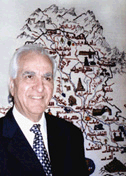Tourism & Charity:
an unrivalled partnership
"It is usually assumed that charity work is separate from commercial activities. Commerce is for material gain while charity work is directed to raising or spending money for humanitarian projects for the weaker, needy, impoverished members of society. The business sector may have once seen these activities as a waste of money but their view has changed in today’s world.’.
It is usually assumed that charity work is separate from commercial activities. Commerce is for material gain while charity work is directed to raising or spending money for humanitarian projects for the weaker, needy, impoverished members of society. The business sector may have once seen these activities as a waste of money but their view has changed in today’s world.
During the past years many international companies tried to improve and polish their images. They started declaring that they put aside a certain percentage of their profits to benefit charities and encourage their customers to give to charities. For example:
• British Airways distributes small bags as passengers are leaving the airline in the hope they will donate their small change or unwanted notes from the countries they have just visited to be used for the benefit of worthwhile causes. It has also put glass boxes at the airports to collect unwanted currency. Seeing these boxes is often enough to make people empty their pockets. The donors may think their contributions do not add up to much but the money soon mounts up, especially when we take into account the large number of international travellers. Donations are now being collected on behalf of UNICEF and many charities are
interested in the British Airways boxes.
• Reed International, specialist organisers of tourism exhibitions in many countries including Egypt and the UAE, started to dedicate a percentage of their income to charity. The company calls upon the exhibitors to contribute a surcharge on the cost of their participation towards charity. Many other exhibitors have followed this example. Reed also set up a charity called "Just a Drop" to collect donations from teams of volunteers who take part in sponsored adventures in remote, challenging areas.
• The British Foreign Office, a number of travel and tourism agencies and others working in the tourism sector are trying to form a charity for the conservation and enhancement of the environment.
• Our colleagues in the tourism media, eTurboNews, started a collection for the victims of "Bam" earthquake in Iran - a commendable effort that should be encouraged and respected.
These are just a few examples of the numerous initiatives - both those of individuals and companies - to use international travel, and even travel within a single country, to collect money for different charities working towards improving the quality of life.
After this snapshot of donations and charitable initiatives from the developed world we turn to tourism in developing countries. What is the state of tourism in developing countries and the Muslim
World in particular?
The tourism sector in the developing world is weak; developing nations must nuture it through well thought out strategies and finance if it is to survive. If society takes cares of the tourist sector this sector will in turn play a beneficial role in society. Once it is
established the tourist sector can assist society through charitable initiatives.
The first priority of these charities should be the provision of free services and voluntary labour. Financial contributions can come later. The time and effort of dedicated people may be more valuable than millions of pounds. Throughout the Muslim world charitable projects: search and rescue after a natural disaster, environmental conservation and the provision of clean drinking water, are generally undertaken by agencies outside the region. It is time for the people of the Muslim world to assume responsibility for these projects, help themselves by
themselves and respond to all the needs of their societies.
What is to be done? What are the priorities? Every country has its own needs best known to the citizens of that country who can:
• Set up charities to clean the whole town - not just the tourist areas.
• Modernise transport, control the flow of traffic and improve ways of dealing with tourist traffic and travellers.
• Upgrade the standard of accommodation in religious and pilgrimage sites and encourage homeowners to provide accommodation for visitors at the height of the season when hotels and guest houses cannot cope.
• Improve hygiene standards in restaurants and pay special attention to the quality of food preparation.
• Ensure tourists are well treated and not overcharged.
• Establish exemplary museums and libraries to show local culture, artifacts and heritage at its best and acquaint visitors with the history of the town or state. This may encouraging individuals to bequeath their own collections to these museums.
• Preserve the facade of buildings in accordance with local character and taste.
• Create a peaceful environment for tourists through the enforcement of strict laws improving traffic flow and easing congestion.
This will contribute to the enhancement of the local environment, heritage and life in general. It will also play a positive role in raising spirits and changing the psychological orientation of the locals so they will have a more positive attitude towards life without depression and neurosis. Tourists will also benefit from the positive disposition of the locals who deal with them and provide essential services.
In Western cities, be it in shops or on public transport, there is an eagerness to serve which uplifts the soul and generates a love of the country and its people. Such sentiments are absent in countries where the streets are unkept and strangers are greeted with rudeness and suspicion.
Muslim countries have something to learn from the West in this respect. Individuals and societies, with the help of governments in the Muslim world, can change for the better. Charities with specific functions can be set up. Above all they must raise the social awareness of their members and educate them.
There is an essential role for volunteers who believe in the message of benevolent tourism. The committees supervising these charities have to pay the utmost attention to the safety and welfare of the volunteers. In my book "The Humanitarian Jihad in Islam" I refer to them as "Mujahiden" rather than volunteers, so would there be an objection to calling these charities "The Charities of Tourism Jihad" and their volunteers "Mujahiden?" It is incumbent on governments to help these charities and to enact legislation to ensure that they keep to their declared charters.
Appropriate legislation can facilitate the charitable donations of individuals and remove all bureaucratic hurdles and unnecessary red tape. The charitable individual has to provide the finance so that these
societies have the resources to work effeciently.
When such a programme is implemented - even if only partially - the tourist will feel eager to return to which ever Muslim country he or she has visited. Satisfied visitors will be a walking, talking advertisement for numerous tourist destinations and they will encourage more visitors.
With the right input from every quarter this positive cycle will continue. Will Muslim countries channel their energies in this direction? I sincerely hope so. It is important that young people do their duty, serve their country, and work for the sake of humanity and a better future. This is my call for action. The Qu'ran urges us to do our best:
"And say: "Work soon will Allah observe your work and his apostle, and believers".
May Allah guide us to the best of deeds.
A. S. Shakiry
|

